Cassette Tape Comeback as sales boom: Why YOU should record to tape!
We’re witnessing a cassette tape comeback! The humble compact cassette experiences its biggest sales in over 20 years. Here’s why you should consider re-discovering the format first launched in 1963…
Cassette Tape Comeback
You may have seen the headlines in the mainstream press, “cassette sales boom” or “tape makes a comeback” for example. For those of us of a certain age, this might seem rather unbelievable. And yet, it’s all true! We really are witnessing a Cassette Tape Comeback!
The humble cassette tape, first launched by Phillips back in 1963, is experiencing its biggest sales boom in decades. But why are more and more people turning to this analogue relic from the last century? More importantly, here are some of the reasons why you should consider recording and releasing your music on cassette tape…
The Compact Cassette
Originally previewed back in 1963, the Compact Cassette, to give it its official name, was debuted by Phillips. Invented by Lou Ottens, the Cassette sought to overcome existing tape format issues: cost, complexity, reliability, and ease of use.
By pre-threading the tape in an easily loadable tape “cassette”, you could now listen to music without having to worry about threading up open reel spools. Additionally, the tape speed was reduced to 4.75 cm/s, the tape width to an eighth of an inch, and the tape tracks split across four interleaved tracks.
These design decisions mean you can fit a lot of music on a cassette tape for little cost. Unfortunately, it also means there’s a constant battle against tape noise. It took until the 1970s and the advent of better tape formulations, and latterly Dolby Noise Reduction before the audio fidelity of the Cassette Tape improved.
Thankfully, by the time the 1980s arrived the cassette tape was all primed for its most iconic decade. Sony’s Walkman arrived, and every teenager had a boombox in their bedrooms allowing them to make their own mixtapes and take them with them… or in their begrudging parent’s car!
Cassette Tape for Musicians
You might wonder what all this nostalgia and the cassette tape comeback have to do with music-making in the 21st Century, and that’s a valid question! Compared to digital formats, cassette tape offers a terrible signal-to-noise ratio, and limited bandwidth.
However, even here in the 21st Century, the Cassette Tape has a lot to give us as musicians. Those same qualities designed into it in the 60s, are still relevant if you’re looking for an affordable analogue music format.
A look at the plugin market shows we still desire the unique sound and sonic character of cassette tape. If you’ve never worked directly with analogue tape before, you might be surprised at what a creative medium it can be. Pushing the record levels into saturation gives a lovely, gentle distortion and compression to audio signals. Additionally, that tape hiss, noise, wow and flutter can be just the antidote to clean, perfect, stereo signals!
You are currently viewing a placeholder content from YouTube. To access the actual content, click the button below. Please note that doing so will share data with third-party providers.
Bouncing to tape
One of the easiest ways of getting tape tone is simply to bounce your audio from your DAW to tape, and then re-import it. To do that you’ll need a tape recorder; scour the local 2nd hand ads and you’ll still find one cheaply. Alternatively, there are still a handful of tape decks still available, new!
My top tip would be to try and find a “3 head” tape deck; these allow you to monitor the signal directly off tape, in real-time. Additionally, a 3 head deck means you can get some authentic slapback echo effects, just like the 1950s!
Of course, the cassette tape has been used in a number of dedicated pieces of music kit over the years. The most famous of which is the Tascam style Portastudio that became so popular in the 80s and 90s.
While it’s unusual to be able to pick these up cheaply nowadays, they can be a very rewarding tool. Utilising all four tracks of the compact cassette (and sometimes even offering as many as eight tracks), along with varispeed, a portastudio offers a unique experience for musicians.
You are currently viewing a placeholder content from YouTube. To access the actual content, click the button below. Please note that doing so will share data with third-party providers.
Releasing your music on Cassette Tape
Without a doubt, the fuel for the cassette tape comeback has come from artists choosing to release their albums on tape. We recently discussed the merits of physical formats vs digital streaming and cassette tape has a big part to play in that discussion.
If you’re looking to release your music on a physical format, then you may have considered a vinyl release. Unfortunately, production costs and lead times for vinyl have become prohibitive for many independent artists; enter once again, the humble cassette tape!
Tape duplication doesn’t rely on the long and expensive mastering and production processes necessary with vinyl. As a result, it’s possible to release your music relatively cheaply and with little fuss on cassette tape. As a merch item for shows, its small size and affordable price point make it a great merch option; especially if you include a digital download code!
You are currently viewing a placeholder content from YouTube. To access the actual content, click the button below. Please note that doing so will share data with third-party providers.
What’s your view on the cassette comeback? Is it a welcome return to a format of your youth? Are you new to analogue tape and discovering it for the first time? Or, do you feel cassettes belong in the bin along with all the other retro nostalgia? Let us know in the comments!

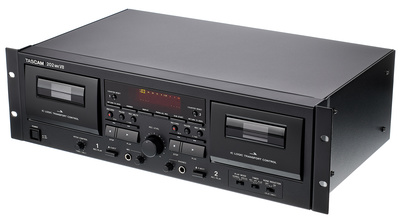

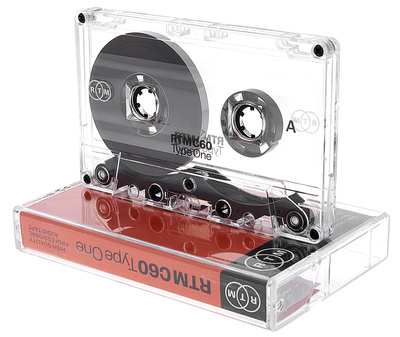
More info:
Video:
You are currently viewing a placeholder content from YouTube. To access the actual content, click the button below. Please note that doing so will share data with third-party providers.
*Note: This article contains promotional links that help us fund our site. Don’t worry: the price for you always stays the same! If you buy something through these links, we will receive a small commission. Thank you for your support!
14 responses to “Cassette Tape Comeback as sales boom: Why YOU should record to tape!”

 4,1 / 5,0 |
4,1 / 5,0 | 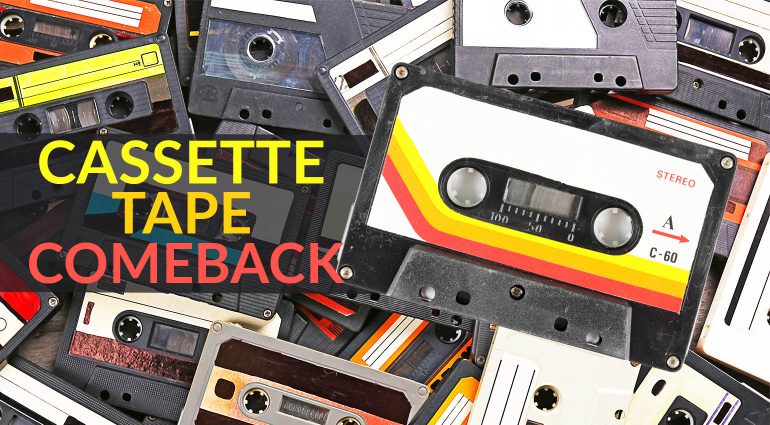


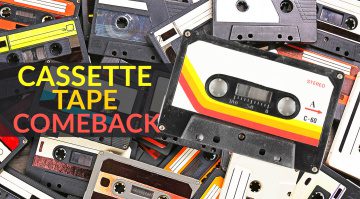

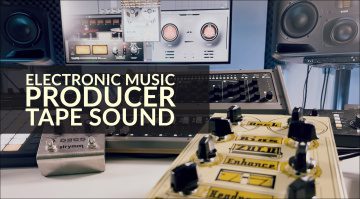
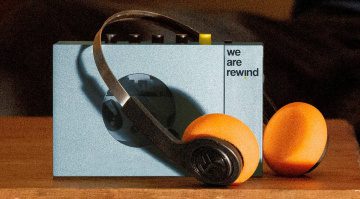
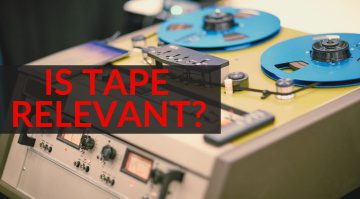
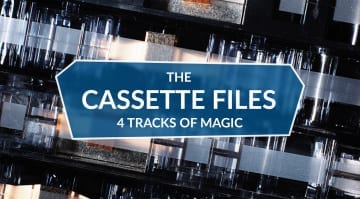
got a 4 track tascam for my future release 2 month ago! love it!!!!!!
This is just dumb, I am old enough to remember all of its limitations and terrible fidelity, and young enough to look to the future for better options. The tangible aspect of this is driving this craze and stupidity.
I totally agree with Sarah. I learned the basics of recording on cassette when there was no other option for home studios. I learned to mix even before owning a portastudio, thanks to the necessity of having to be inventive on zero budget. While it was a fantastic training ground and I don’t regret it for a moment, I wouldn’t go back in a million years.
We spent the 1980s and 90s trying to make things sound better… and now it’s the fashion to try and make them sound worse. Go figure.
back in the early ’80’s, there was a format developed called Elcassette. it used a larger cassette, and utilized 1/4″ tape like reel to reel did. it sounded much better than cassette did.
the only other analog format that was semi convenient was VHS HiFi. It has the potential to sound better than 1/4″ reel to reel tape.
I thoroughly regret literally throwing away my Fostex X-26 multitrack in the 90’s, when I discovered how incredible minidisc’s were for archiving my tracks. I recently recreated my late 80’s home studio setup using the exact same hardware, but without the X-26 at the end of the chain, it just didn’t sound the same and despite having the original patches and sequence data loaded, I couldn’t match the character of my original cassette recordings (I do have a decent Sony deck to listen back on). Now I definitely appreciate the extra warmth that a little wow, flutter and hiss adds to a recording.
Well… in 2000 cassettes were already a dead medium…
so… “biggest sales in 20 years” doesn’t mean much does it ?
My cassettes ended up in the dust bin. No regrets. I listen to accurate (1st presses, by the way, not remasters) rips through my Sonosax M2D2 DAC. Cassesttes are just a weird toy, a fetisch
Having spent the last 40 years working at the top of the UK recording & Broadcasting industries.
This is a pointless fad that will soon be over.
And they do not even have the nice 12” cover that comes with the, equally poor sounding, vinyl fashion.
I have a Nakamichi 582 cassette deck, who’s sole purpose is to transfer audio (unavailable elsewhere) from cassette into the digital domain.
Once transferred the cassettes are either scrapped or put on the shelf for posterity.
the fact that reasonable people are emotionally triggered by this happening is strange. I suppose it has to do with the freedom we have to express ourselves semi anonymously online… we can release some repressed angst. I can’t imagine having a well recorded cassette via a mid grade nakamichi deck and some midgrade akg headphones resulting in a listener flinging the phones across the room in horror and disgust. we audiophiles like to get nitpicky, but honestly, the cassettes were a fine option for listening to some music. I have a Lyrec Tr55, A Studer 807, a Lenco turntable , and a pair of nakamichi mid grade cassette decks. I don’t know how many times I’ve had people insist that CD/hi res digital “kills” vinyl/Tape etc. I’ve had several “showdowns” with 15ips production master dubs, various vinyl pressings, and their dap/dac versions. The vinyl is usually a revelation to the people who don’t own or bother with it. but the 15ips dubs blow everything out of the water, it’s laughable. Beatles Revolver, KOB, Sketches of Spain, and DSOTM are staples, for these showdowns, as not many folks dig classical music. a decent cassette dub is easily as enjoyable as a Spotify stream, and often more “meaty”. But… cassettes are fiddly, the players are prone to failure and require constant maintenance, and by God, annoying pretentious, terminally unique young people like them. I hear Audio Technica is manufacturing the “Sound Burger” again. That’s how bad it’s gotten. I’m almost ready to pack it in, sell all of my reel to reel machines, decks, TT’s cartridges and tonearms and just get a decent dac and streamer. Any recommendations? I realize that I’m biased, but at my age it’s not like anything above 15khz is getting through anyways.
You are right about the angst) Still, the compact cassettes have so many limitations and flaws compared to digital that I reserve to my lossless copies. I don’t dig vinyl either. The best media is reel to reel 15 ips, but it is unrealistic to get – what would it be? – second/third generation copies of masters? ) Slower speed is fine too, but the same problem with price and availability. Furthermore, you have to rewind/load tapes which takes time, they age, CC tapes saturate sound (which is exactly the reason most people like the tape) and don’t reproduce anything above 16k. The look and smell nice tho.)
Anyone is free to find the sound of their preferred medium “nicer”, But as others have pointed out, there is no sense in which cassettes are “better”, they are in fact worse on every measurable parameter (frequency response, distortion, wow and flutter, dynamic range, noise, phase integrity, stereo separation etc.) than decent quality digital recordings. This is also true for vinyl and reel-to-reel, though to a lesser extent. If you prefer the sound of a recording with added “warmth” (i.e. harmonic distortion), all well and good. But it is not better.
Also a small factual error; the four tracks on a stereo cassette are not “interleaved” (para 4), the left and right tracks in each direction are alongside each other. If they were interleaved, it would not be possible to replay stereo cassettes on a mono player.
while I incline towards the idea that cassette is another retro fad I still have cassettes that I made in the 70’s. They play perfectly. They were copied from vinyl, I also possess cassettes copied from master tapes, immaculate sounding.
The problem I usually found was incorrect azimuth, hence ownership of a 3 head deck.
On the other hand owning an LP or tape doesn’t require a EULA. Or DRM, or a credit card, or an internet connection, or the latest update of an app or a PC, or an iPhone, or a lightning capable adapter for your headphones which need to be charged, or are paired with the wrong device. I turn on my stereo, drop the needle and music comes out of the machine. There is a refreshing peace that comes with that.
It doesn’t seem that the high end quality wise tapes are manufactured any more. Would think that is a a huge problem with any resurgence of popularity. That and no new machines for sale to handle the better tapes.
You are currently viewing a placeholder content from Facebook. To access the actual content, click the button below. Please note that doing so will share data with third-party providers.
More InformationYou are currently viewing a placeholder content from Instagram. To access the actual content, click the button below. Please note that doing so will share data with third-party providers.
More InformationYou are currently viewing a placeholder content from X. To access the actual content, click the button below. Please note that doing so will share data with third-party providers.
More Information